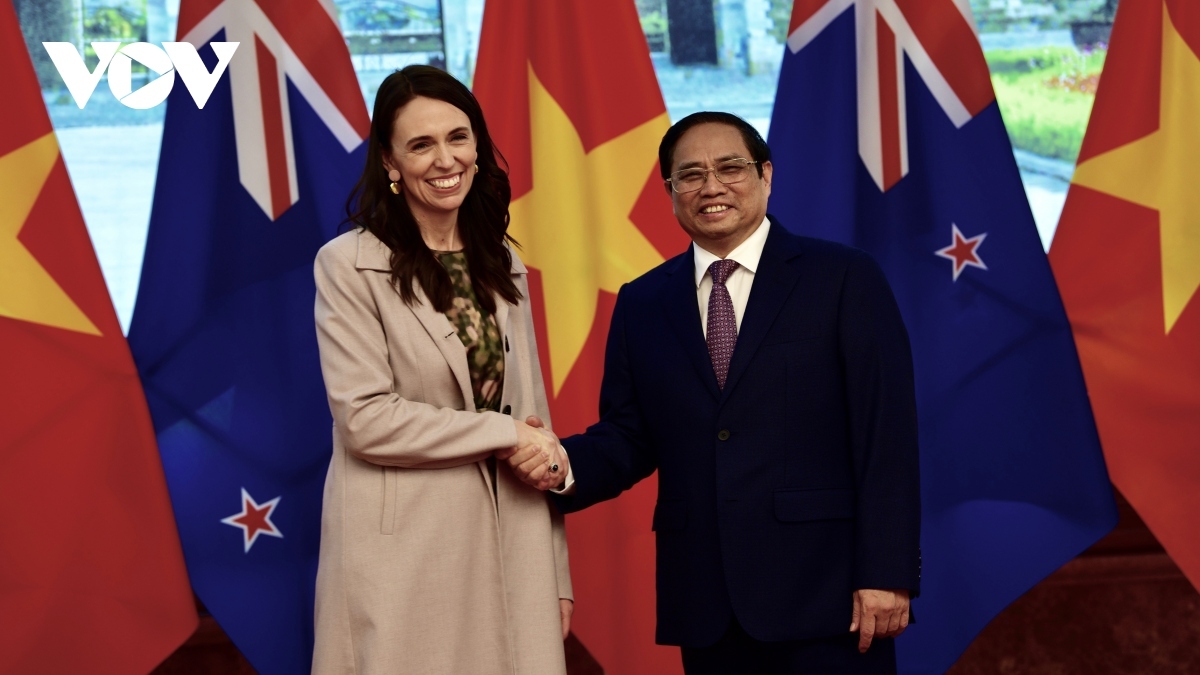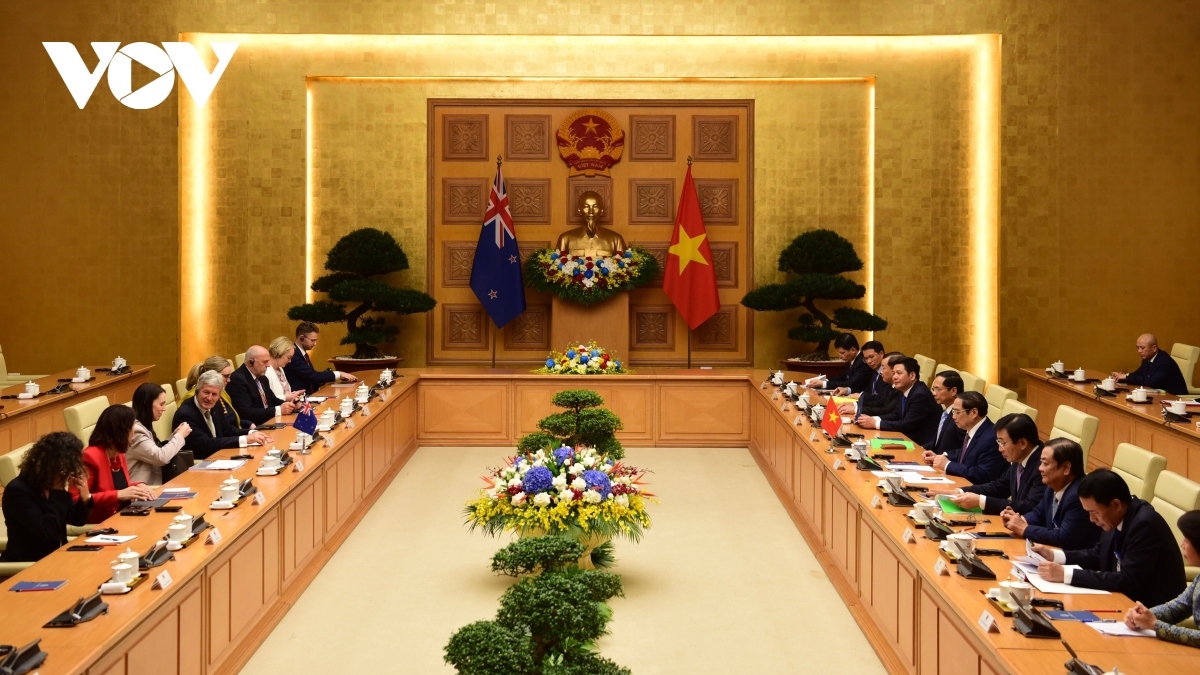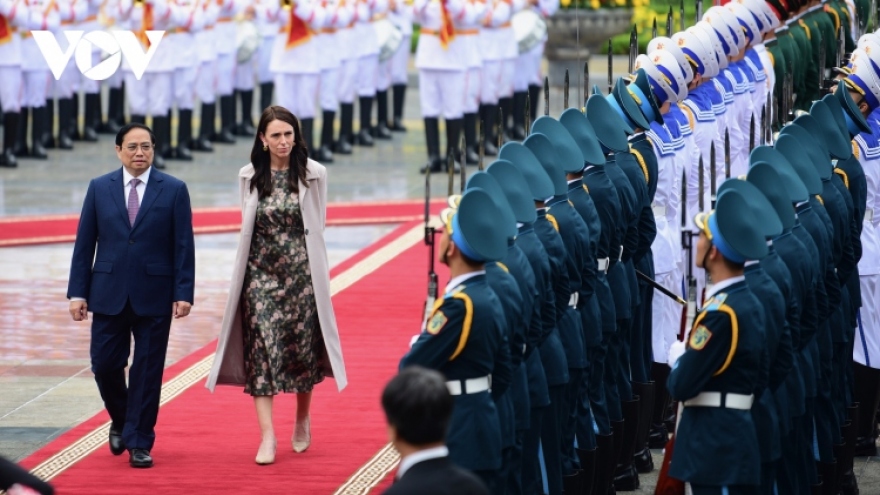Vietnam, New Zealand set sights on US$2 billion trade target in 2024
VOV.VN - There remains ample room for Vietnam and New Zealand to further boost trade cooperation toward US$2 billion in bilateral trade in 2024, Prime Minister Pham Minh Chinh and his NZ counterpart Jacinda Ardern shared the view during talks in Hanoi on November 14.

They agreed that trade cooperation is a bright spot in the two countries’ relations, with two-way trade turnover last year rising 26.7% year on year to US$1.3 billion. The first nine months of 2022 alone saw trade exchanges between the two countries increase 13.6% to US$1.1 billion.
To meet the 2024 target, they agreed that Vietnam and New Zealand should maintain high-level reciprocal visit exchanges and effectively implement bilateral cooperation mechanisms, including an action programme to realise their strategic partnership for 2021-2024.
Ardern took the occasion to announce that New Zealand has decided to open its market for pomelos and lemons imported from Vietnam. She also affirmed New Zealand will continue to create favourable conditions for Vietnamese farm products to access the New Zealand market in the time ahead.
The two sides also vowed to work closely together to effectively implement regional free trade agreements to which the two countries are members, such as the Comprehensive and Progressive Agreement for Trans-Pacific Partnership (CPTPP) and the Regional Comprehensive Economic Partnership (RCEP), to help enhance cooperation and diversify supply chains.
Chinh affirmed the Vietnamese Government will create conditions and encourage New Zealand businesses to invest in Vietnam in areas where New Zealand has strengths and Vietnam is in high demand such as education and training, processing – manufacturing technology, agriculture, forestry, fishery and construction. He proposed that the government of New Zealand support and facilitate Vietnamese operations in the country.

The Vietnamese PM highly appreciated New Zealand’s provision of nearly NZ$27 million in development aid to Vietnam for 2022-2024, and suggested New Zealand continue ODA support for technical assistance projects in the fields of agriculture, climate change response, health care and innovation.
The two PMs consented to continue promoting cooperation in other fields, including education-training, tourism, aviation, culture, sports, labour, and agro-forestry-fishery. They highly appreciated the signing of cooperation agreements on education and civil aviation between the two countries during Ardern’s visit, and agreed to assign relevant ministries and agencies to study, negotiate and sign more cooperation agreements on tourism and culture.
They were also adamant that Vietnam and New Zealand should expand cooperation to other fields such as defense industry, military medicine, UN peacekeeping engagement, cyber security, transnational crime combat, counter-terrorism, natural disaster prevention, search and rescue, as well as climate change response, digital transformation, and green growth.
They assigned relevant agencies of the two countries to examine the signing of documents on extradition and transfer of convicted persons, and on criminal and civil legal assistance.
The two PMs voiced their support for the two countries’ continued and close coordination at regional and international forums, especially the United Nations, Association of Southeast Asian Nations (ASEAN), and Asia-Pacific Economic Cooperation forum (APEC).
Ardern affirmed that New Zealand attaches great importance to the development of the strategic partnership between New Zealand and ASEAN and always supports the grouping’s central role in addressing regional issues. She also reiterated New Zealand’s continued support for cooperation in the Mekong sub-region in key projects on climate change response, smart agriculture-forestry-fishery, sustainable management of water and other natural resources, high-quality infrastructure development, and digital transformation.
Exchanging views on the situation in the East Sea, the two leaders emphasized the importance of maintaining and promoting peace, security, stability, safety and freedom of navigation and overflight in the regional waters. They voiced support for efforts to promote dialogue, enhance trust, and settle disputes by peaceful means, in accordance with international law, including the 1982 United Nations Convention on the Law of the Sea (UNCLOS).
After the talks, the two PMs witnessed the signing of cooperation documents between the two countries and co-hosted a press briefing on the results of the talks.



